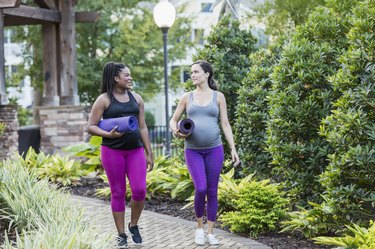
Pregnancy: It's miraculous, beautiful and inevitably full of change. Some of those changes are glorious — like glowy skin, comfy maternity clothes and baby kicks. And some are, well, not so glorious — like nausea, fatigue and weight gain.
As your body changes, so too will your exercise regimen. And that's OK — the single most important thing is to keep both yourself and baby safe during pregnancy. The overarching goal is to gain a healthy amount of weight that supports baby and the additional physiological toll on your body — not to cut calories, lean out or tone up.
Video of the Day
Video of the Day
However, it is 100 percent possible to maintain an exercise routine that helps you maintain your body composition, get stronger and prepare your body for postpartum physical activity. Here, two personal trainers and a registered dietitian explain how.
Tip
Always check in with your physician, ob-gyn, midwife or someone else on your care team before starting a new exercise regimen while pregnant.
Keep Weight Gain in Check With a Healthy Pregnancy Diet
First things first: Pregnancy is not the time to cut back on calories, dietitian Carol Aguirre, RD, LDN, tells LIVESTRONG.com. In fact, you'll need to gradually increase your caloric intake as your pregnancy progresses.
"Women who were at a healthy BMI (18.5 to 24.9) before becoming pregnant need a gradual increase in calories as the baby develops," Aguirre says. "It is suggested that the first trimester does not require any extra calories. During the second trimester, an additional 340 calories a day are recommended, and for the third trimester, the recommendation is an extra 450 calories."
These additional calories should come from nutrient-dense foods, Aguirre explains, including lean protein, whole grains, low-fat or fat-free dairy, vegetables and fruit. Mamas-to-be should avoid unhealthy extra calories by limiting foods high in saturated fat and added sugars such as soda, sweets and fried foods.
By all means, indulge in pregnancy cravings when they're pulling at you — but in order to get the nutrients you need to support your own body and your growing baby, experts suggest eating a variety of healthy foods, with an emphasis on a few nutrients that are critical during pregnancy.
Folic acid, calcium, vitamin D, quality protein and iron are especially important during pregnancy, according to the European Journal of Pediatric Medicine.
Again, don't get too focused on cutting out foods — and definitely not on cutting weight. You can eat plenty to support pregnancy while maintaining a healthy body fat percentage. There's no getting around the fact that you'll gain some weight, and you shouldn't fight it, Aguirre says.
According to the American Pregnancy Association, pregnant people should gain the following amounts of weight based on their pre-pregnancy BMI:
- Less than 18.5 (underweight): 28 to 40 pounds
- 18.5 to 24.9 (healthy): 25 to 35 pounds
- 25 to 29.9 (overweight): 15 to 25 pounds
- 30 or higher (obesity): 11 to 20 pounds
You can better support your fitness goals during pregnancy by eating the same foods typically recommended for people who are trying to lose fat or build muscle, Aguirre says, which means focusing on complex carbohydrates, protein and whole foods.
"Eating the right diet will complement an exercise regimen," she explains. "Protein contains amino acids, which are essential for muscle growth, and it is suggested that pregnant women with a healthy pre-pregnancy BMI consume roughly 80 grams of protein a day."
Complex carbohydrates can also help you build muscle and keep up your energy for workouts, because carbs are your body's main source of fuel and convert more quickly to energy than the other two macronutrients, according to the U.S. National Library of Medicine.
Healthy fats can help with sustained energy and satiety, as well as provide nutrients necessary during pregnancy.
All three macronutrients — carbs, fats and protein — are important for supporting a consistent and effective exercise regimen.
Related Reading
Continue Doing Cardio to Stay Healthy
Again, remember that pregnancy is a time to embrace weight gain. Try to avoid getting caught up in a mission to lose fat, and instead focus on keeping your body as healthy as possible during pregnancy.
Holly Roser, CPT, certified pre- and postnatal fitness trainer and owner of the Holly Roser Fitness studio, tells LIVESTRONG.com she wouldn't suggest fat loss as a goal during pregnancy. "In general, pregnancy isn't the time to recomp your body," she says, "but you can absolutely maintain the body composition you have before pregnancy."
Cardio exercise — both aerobic and anaerobic — are great for maintaining cardiovascular health and body composition during pregnancy, Roser says. She recommends walking, biking, cycling on a stationary bike, swimming and doing aqua-aerobics. You can do steady-state cardio (aerobic) or implement moderate intervals (anaerobic) for a challenge.
Moderate weight training with high-volume rep schemes and lower weights can also help you maintain your body composition while pregnant, Roser says.

Lauren "LoLo" Wilson, lead instructor at CycleBar Midtown in Charlotte, North Carolina, has firsthand experience both training pregnant clients and exercising while pregnant herself. For Wilson, cardio came in the form of cycling and strength training came in the form of yoga. These exercises helped her maintain her body composition throughout pregnancy — but more importantly, it made the postpartum bounce-back easier on her body, she says.
"I knew that overall, my body mass would change, but continuing with my exercise regimen helped me prepare for the demands of labor and what would come after," Wilson says.
The key word there is "continuing." If you had a regular exercise routine prior to pregnancy, it's generally safe to continue with whatever you were doing, with modifications to specific movements if necessary. But if you did not exercise before pregnancy, it's imperative to check with your doctor before starting any type of exercise, Wilson says.
Related Reading
Maintain Muscle While Pregnant With Safe Strength-Training
Any resistance training can help you maintain your muscle mass while pregnant, Roser says. But just like you shouldn't focus on losing fat while pregnant, your main goal shouldn't be to put on extra muscle — but you can certainly aim to keep your body strong and stable during pregnancy.
"Strength training while pregnant should be about training your body to carry the extra weight," Roser says. "You're suddenly going to have a lot more extra weight out in the front of your body, so you need to strengthen your posterior chain [glutes, hamstrings and lower back] to deal with that."
For someone who already had an intense, heavy-lifting routine going into pregnancy, Roser says the goal should no longer be maxing out on lifts all the time. Instead, comfortably challenging weights are the move, she says.
"Moderate weights and high reps are going to allow you to keep the muscle you currently have, without the intention of actually growing more muscle while pregnant," Roser says.
Roser offers a sample week of pregnancy workouts for anyone trying to maintain their body composition:
- Monday: 30 minutes of lower-body strength training
- Tuesday: 30 to 60 minutes of low-impact cardio
- Wednesday: Rest
- Thursday: 30 minutes of upper-body strength training
- Friday: 30 to 60 minutes of low-impact cardio
- Saturday: Low-impact circuit training or rest
- Sunday: Rest
Exercises to Avoid While Pregnant
Exercise restrictions vary depending on the trimester, Roser says. "In general, you don't want to lie on your back or your stomach, hold your breath for too long, do isometric moves [like planks] or exercise in very hot environments [like Bikram yoga]," she says.
You should also avoid very bouncy activities and activities where falling is likely, as well as activities that put a lot of strain on your joints — your joints are more lax during pregnancy, so you have a higher risk of sprains, Roser says.
The American Pregnancy Association provides science-backed pregnancy exercise guidelines, but Wilson reminds pregnant people to check in with their care team.
"Talk to your primary care doctor, your ob-gyn or your team of midwives," she says, "and, every time you want to make a change to your exercise routine, ask if it's safe for your particular pregnancy."
Also, Wilson urges moms-to-be to listen to their bodies. "Be very mindful that your body is already under additional stress, and exercise can add to that," she says. "Moving your body is a good thing to do, but know that it's also OK to rest."
- U.S. Department of Health and Human Services: "Physical Activity Guidelines for Americans. 2nd ed."
- Clinics in Sports Medicine: "Pregnancy and Exercise."
- American College of Obstetricians and Gynecologists Committee on Obstetric Practice: "Committee Opinion No. 650: Physical activity and exercise during pregnancy and the postpartum period."
- American Pregnancy Association: "Pregnancy Exercise Guidelines."
- The Mayo Clinic: "Pregnancy and exercise: Baby, let's move!"
- American Pregnancy Association: "Exercise During Pregnancy."
- European Journal of Pediatric Medicine: "Diet in Pregnancy—More than Food."
- American Pregnancy Association: "Pregnancy Weight Gain."
- U.S. National Library of Medicine: "Nutrition and athletic performance."
- Journal of the Academy of Dietetics and Nutrition: "Position of the Academy of Nutrition and Dietetics, Dietitians of Canada, and the American College of Sports Medicine: Nutrition and Athletic Performance"
- Centers for Disease Control and Prevention: "Weight Gain During Pregnancy"
Is this an emergency? If you are experiencing serious medical symptoms, please see the National Library of Medicine’s list of signs you need emergency medical attention or call 911.